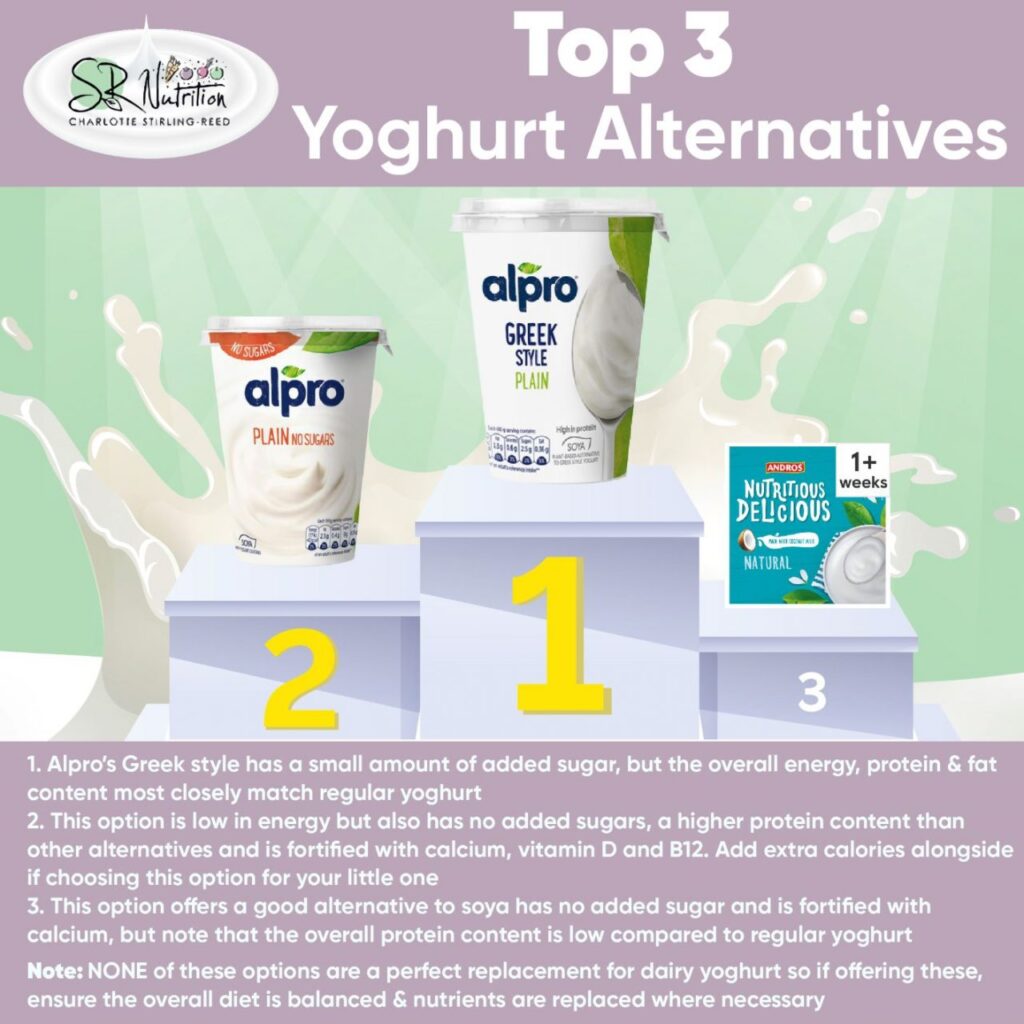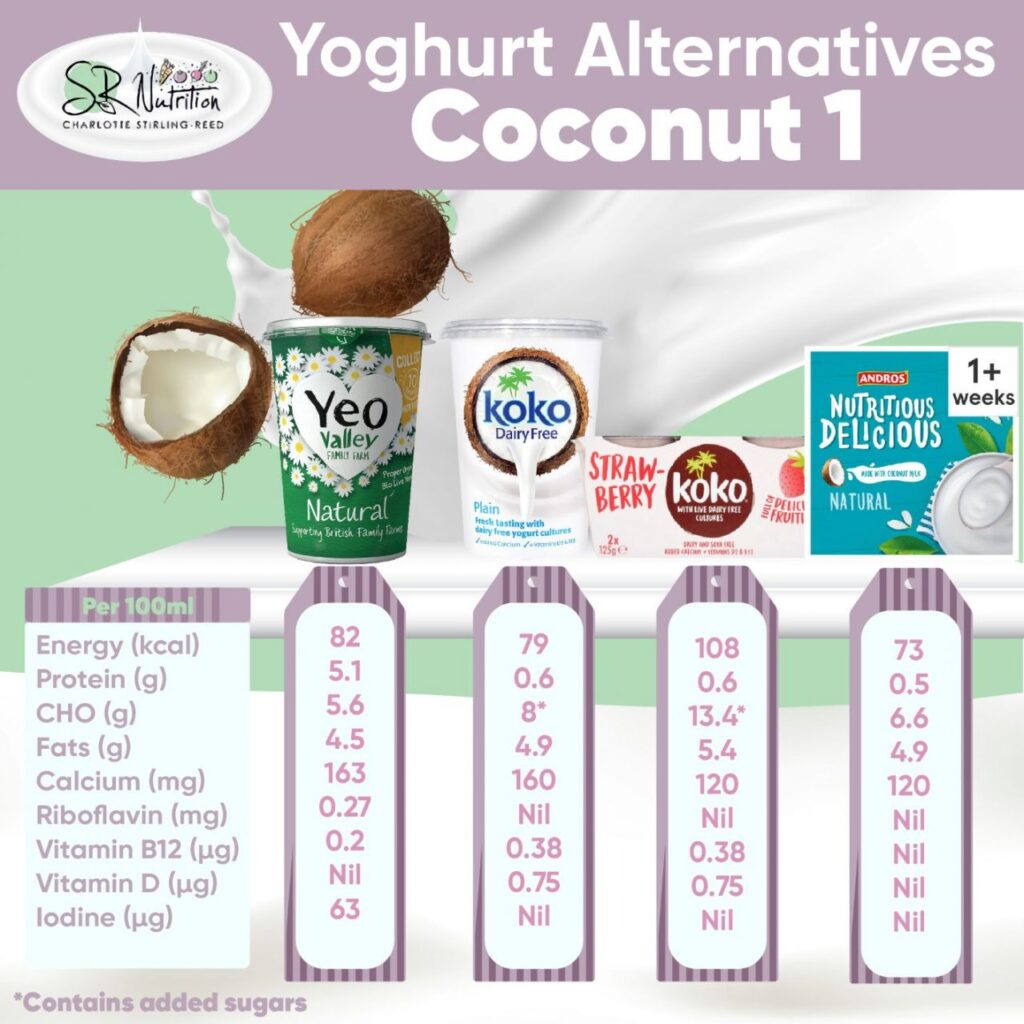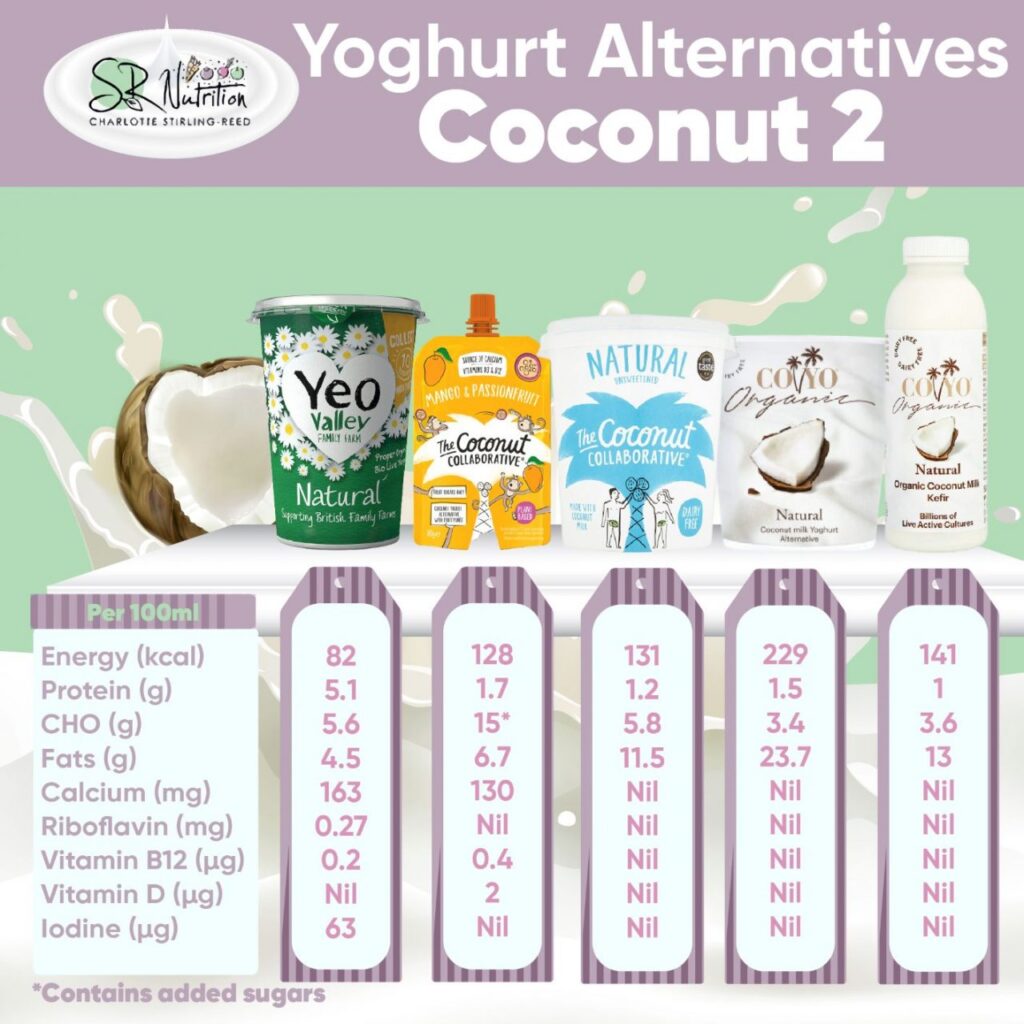Earlier this week I wrote all about yoghurts for children, which didn’t include comparisons of plant-based options as I wanted to write about this in a bit more detail. In this blog I’ll go through some of the most common options on the market and compare when they might be appropriate for children.
What nutrients do you need to be aware of in plant based options?
As yogurt is a dairy food, it is a good source of energy, protein, calcium and iodine, all of which are important nutrients in children’s diets. As with plant-based milk alternatives (read my post on those here), it isn’t always a simple swap from the dairy version to the dairy free version in terms of nutrients. Many dairy free yoghurt options aren’t fortified at all, some are only fortified with calcium and none of the options currently available (that we were able to find) had been fortified with iodine. You can read more on my blog all about iodine, but it’s worth noting that dairy is an important source of iodine for children, so if they are dairy free and don’t eat any fish, you may want to consider a supplement.
Another thing to note is that many of these alternative yoghurts have added sugars and are low in energy, protein and fat and so wouldn’t be ideal as a main source of dairy nutrition for your little ones and wouldn’t be recommend for young babies. If your child is dairy free, make sure you’re including plenty of non-dairy alternatives for the nutrients that yoghurt provides e.g:
- Protein: Meat, fish, tofu, nuts, quinoa, beans and pulses
- Fat: Ground nuts / nut butters, oily fish, avocados, milled seeds
- Calcium: Tinned fish with bones, calcium set tofu, beans and pulses
- Iodine: Fish (white has more than oily)
- Vitamin B12: Meat and fish
Comparing Dairy-Free Yoghurts in the UK
Soya
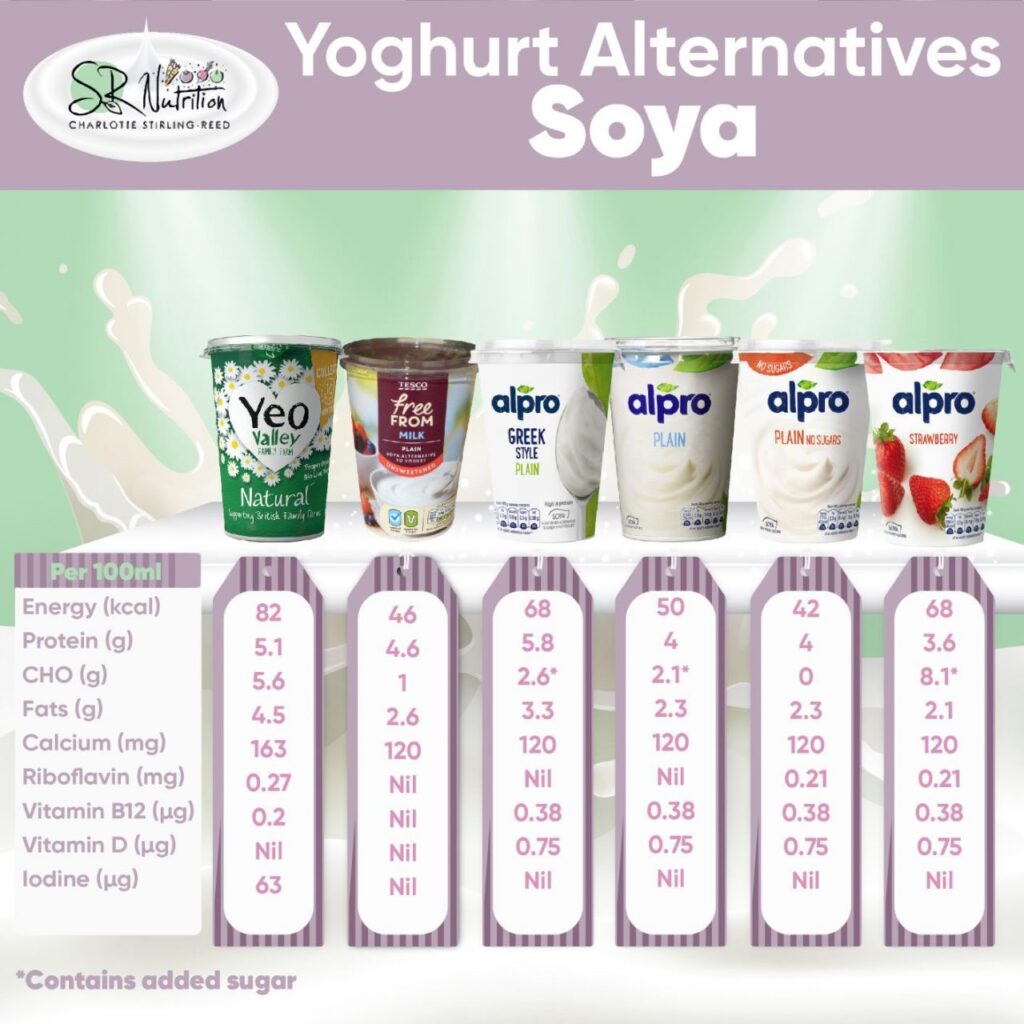

Overall note: Soya yoghurts are generally higher in protein than other dairy free options but still lower in energy and some have added sugar, which isn’t ideal if offering them regularly to children. The Alpro Greek Style option has a small amount of added sugars (2.gg/100g, equivalent to around ½ a teaspoon) but IS fortified with calcium and Vitamins D and B12. It also has a higher overall energy and protein content, which is important for young children. Alpro Plain and the Tesco Free From options are lower in protein and calories, but are both fortified with calcium (Alpro has Vitamins D and B12 as well). The Alpro no added sugar option has quite a low energy content (half that of regular yoghurt), which is a little low for young children, but is fortified with calcium, vitamin D and B12. You could increase the energy content of this by adding nut butter or ground seeds or even stirring in a little oil with it.
Oat & Almond
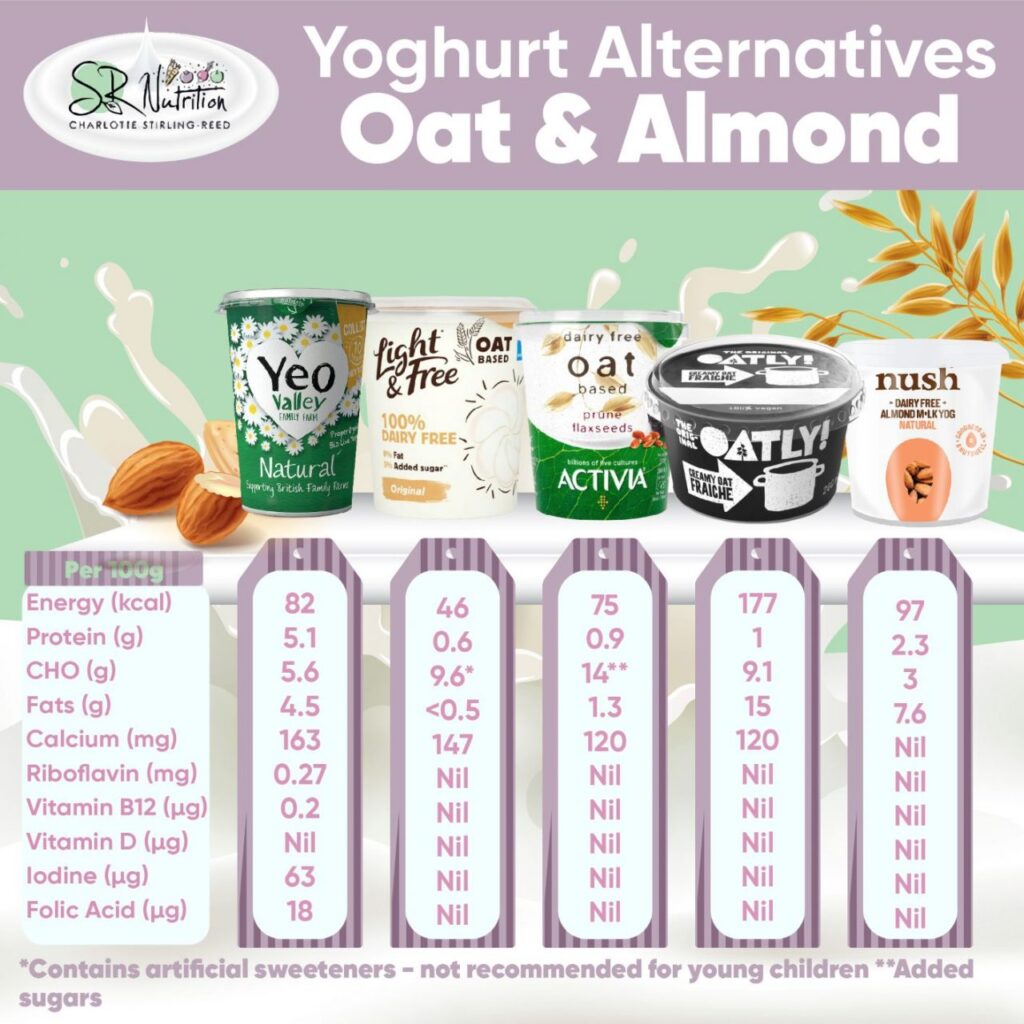

Overall note: Overall, these options are much lower in protein and some low in fat and are fortified with calcium, but no other vitamins and minerals (Nush is not fortified at all). Oatly “Crème Fraiche” is not necessarily a yoghurt alternative, but it can be used as a replacement for yogurt or cream and added to curries, pasta sauces or fruit/cereals in the morning. The fat and energy content are higher, and it is fortified with calcium but it is still fairly low in protein compared to dairy yoghurt. The Sainsbury’s Light & Free option contains artificial sweeteners and wouldn’t be recommended for young children.
Coconut
Overall note: Not all of these options are fortified (even with calcium) and some have added sugars which, as I’ve mentioned, are not ideal as a regular choice. However, if you do offer these to your little one, Koko Natural & Flavoured versions, as well as the Coconut Collaborative FLAVOURED pouches are fortified with calcium, vitamin D and B12 (not the plain CC option), while the Andros option does not have added sugars, but is not fortified with vitamin D or B12.
The coconut yoghurts are all much lower in protein when compared to dairy yoghurt, however, you could improve the protein content of these options by adding in some nut butter or ground nuts/seeds! Another thing to note is that coconut yoghurts tend to be higher in saturated fat. If your little one is only having coconut yoghurt as a dairy alternative this shouldn’t be a problem, but if they’re also regularly having coconut milk and some cheese alternatives (which tend to use a coconut oil base), it could mean that their overall intake of saturated fat becomes quite high so it’s worth monitoring their overall intake of coconut-based products.
The best alternative yoghurts for children?
Based on all of this information, here are our top three dairy-free yoghurt alternatives.
1.) Alpro’s Greek Style plain yoghurt comes out top – even though it has a little added sugar, it’s a relatively small amount (~1/2 a teaspoon/100g) – and it also is much more comparable with dairy yogurt in terms of energy, protein and fat and lastly is also fortified with calcium, vitamin B12 and vitamin D. On balance therefore, this one is the best option. If only it had some iodine too!
2.) Alpro’s Plain No Added Sugar yoghurt comes out second – it has no added sugars, a higher protein content than other alternatives and is fortified with calcium, vitamin D and B12. However, it is really important to note that the energy content is low – half that of regular yoghurt. If you’re offering this regularly to your little one, make sure to add calories to it or generally into baby’s diet) to increase the energy content – for example by adding nut butters, ground nuts/seeds, oats or Weetabix.
3.) Finally, as a third option, Andros Nutritious Delicious closely matches regular yoghurt, except for protein, as coconut is naturally low in protein. It does contain some pea protein, so some children with allergies may need to avoid this one. It also has a “may contain” warning for traces of nuts and soya, which Koko plain does not have, so for children with allergies, Koko plain may be the preferred option.
Top Choices:
These 3 options have been chosen by a registered nutritionist, registered allergy dietitian and a student dietitian to offer the closest replacement to regular yoghurt. Ultimately, if your child is dairy free, it’s important to note that NONE of these options are a perfect replacement as a straight swap for regular yoghurt. To ensure your little one doesn’t miss out on nutrients they might otherwise get from dairy, you can offer a variation of all of these alternatives as well as ensure that your little one’s diet is varied and balanced overall. You can read more on my blog on vegetarian diets for children here.
